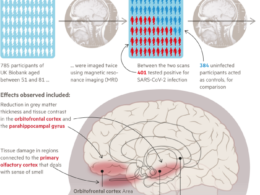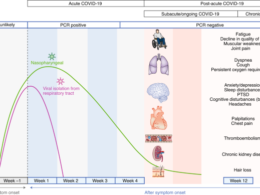healthtransformation
.foundation
Joaquim Cardoso MSc
February 15, 2024
This summary is based on the article “Virus and Booster Apathy Could Be Fueling Long COVID”, published by Medscape and written by Debby Waldman on February 14, 2024.
What is the message?
Virus and booster apathy may be contributing to the persistence and severity of long COVID cases, as illustrated by the experiences of individuals like Maria Maio.
Despite widespread vaccination efforts, a significant portion of the population remains under-boosted, leading to increased vulnerability to long COVID.

ONE PAGE SUMMARY
What are the key points?
Under-Boosting Trends: While approximately 80% of adults in the United States have received their initial vaccine series, only around 20% are up-to-date on booster shots. This discrepancy highlights a concerning trend of booster apathy contributing to increased vulnerability to long COVID.
Long COVID Persistence: Individuals who contract long COVID continue to experience debilitating symptoms, including brain fog, fatigue, and respiratory issues, months after their initial infection. The symptoms vary in severity and duration, posing significant challenges to patients’ daily lives and overall well-being.
Varied Symptomatology: Long COVID symptoms have evolved since the pandemic’s onset, with fewer patients experiencing pulmonary damage but an increase in neurological and cognitive issues such as brain fog, forgetfulness, and exercise intolerance.
Treatment Challenges: Effective treatment options for long COVID remain limited, with physical therapy and exercise training showing promising results in managing symptoms. However, there is no one-size-fits-all solution, and recovery often requires time, patience, and multidisciplinary care.
Importance of Vaccination: While vaccination is not a guarantee against long COVID, it significantly reduces the risk of severe illness and complications. Maria Maio’s experience underscores the importance of adhering to vaccination schedules and recognizing the potential consequences of vaccine hesitancy.
What are the key examples?
Maria Maio’s Experience: A celebrity makeup artist, Maio experienced long COVID despite being fully vaccinated and boosted until she skipped her latest booster shot, emphasizing the importance of vaccine adherence.
Dean Jones’s Case: A biochemist and professor, Jones developed severe long COVID symptoms after his fourth COVID infection, highlighting the unpredictable nature of the condition and the challenges of managing its diverse manifestations.
What are the key statistics?
Approximately 20% of adults in the United States are up-to-date on booster shots, leaving a significant portion of the population vulnerable to long COVID.
A Journal of the American Medical Association study identified 37 common symptoms of long COVID, with neurological and cognitive issues being predominant among patients.
Conclusion
The persistence and severity of long COVID underscore the importance of vaccination and booster adherence in mitigating the risk of post-infection complications.
While treatment options are evolving, prevention remains the most effective strategy against the long-term consequences of COVID-19.
Public awareness campaigns emphasizing the importance of vaccination and vigilance against the virus are crucial in combating vaccine apathy and protecting public health.
To read the original publication, click here.












